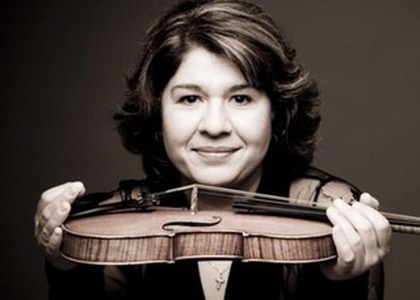> Interviews

Interview with violinist Mihaela Martin, president of the jury of the “Ion Voicu” International Violin Competition
On Saturday, April 12th, 2025, at 18.00, the finals of the first edition of the "Ion Voicu" International Violin Competition will take place. The event will take place on the main stage of the Romanian Athenaeum, with the participation of the Philharmonic Orchestra of Bucharest, conducted by Gabriel Bebeșelea. Wakana Kimura and Koshiro Takeuchi from Japan and Jaime Naya Maceira from Spain will perform in front of a jury chaired by violinist Mihaela Martin. On this occasion the renowned musician spoke to Ioana Țintea.
Mrs. Mihaela Martin, you are the president of the jury of the first edition of the Ion Voicu International Violin Competition. What does this invitation mean to you and what does it mean in general to organise such a competition in Romania, dedicated to the memory of the renowned violinist Ion Voicu?
I gladly accepted the role of president of the jury, because, as we all remember, I grew up and was educated at the music high school, at the Ciprian Porumbescu Conservatory, and all these years I listened to countless concerts that Maestro Ion Voicu performed. He was a musical figure, not only on the Romanian stage, but also internationally for many years. He was a very strong musical personality. I think the initiative to create this competition is very admirable, because he is a musician who represented Romania everywhere and I believe we owe it to him to honour him with this competition.
What's new about this competition compared to other established competitions?
It is a competition with the standard repertoire that is played in other competitions. The fact that it has been organised in a fairly short time, has already made it possible for the participants not to be confronted with situations where they would have to learn a lot of new works. In the second round there are also two works that actually have the dimension of an encore, if I may say so, composed by Maestro Ion Voicu, but otherwise it is a programme that every young musician has in his repertoire.
How would you describe Ion Voicu's artistic legacy? What should young musicians know about him?
I think that there is quite a lot of material in the radio and television archives, because he was a very prolific musician, who, as I told you, had countless appearances on the Romanian stages. He had a certain elegance in his singing, which, to a certain extent, is part of the old school, you could say, where there was a great deal of respect for the composer and a certain culture that is not fashionable, so culture must always be maintained and preserved as something very precious in the performances of all, regardless of age. Especially here in Romania, where everyone has access to these archives, I think it is a very valuable source of inspiration and education.
There were entries from over 13 countries. How do you see this internationalisation of the competition since the first edition?
It is very gratifying, that although the time since this competition was announced has been short, it has nevertheless resonated strongly. Twenty-four of those who applied were chosen. That's always the case after they apply and are accepted, a lot of them get together, either because they have other gigs or they think that if they have a concert, the concert is actually safe, and then they prefer to choose the concert, for example. In any case, for the final, it's most important to have strong winners and I think it's going to be a very interesting final.
How do you see the role of competitions today in a young musician's career?
There are so many competitions. It seems too many to me, but that's my personal opinion, because I finished taking part in them when I was 24, which is quite early nowadays, but I had already done a lot of contests and won a lot of them, but that's the way of the times. There are a lot of contests, but I think it's also a source of income somehow, because there are a lot of young people who finance their own studies and they go from contest to contest a lot. What would be very important would be if they really managed to make a little bit of progress from one contest to the next. If they are just repeating themselves with the same repertoire, the same way of performing, without progressing between competitions, then they are not really taking steps that always have to be taken in a certain direction, which is what they should really be doing.
What do you wish for the future of this competition?
I wish it much success, longevity, as any musical event, no matter where it is, and especially for me that it is here in the country where I was born, I always wish that music, and through these artistic events - contests, to occupy more and more space in people's hearts and to increase the number of music lovers.
Translated by Miruna-Andreea Vartic,
University of Bucharest, Faculty of Foreign Languages and Literatures, MTTLC, year I
Corrected by Silvia Petrescu














